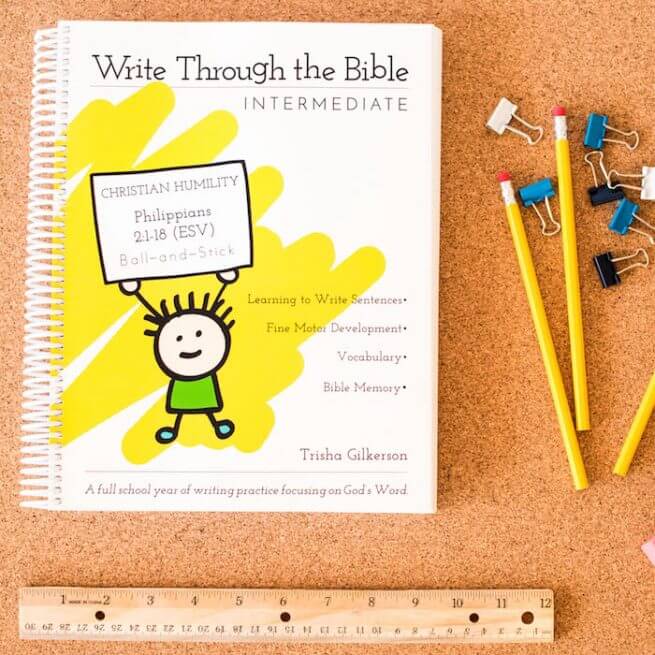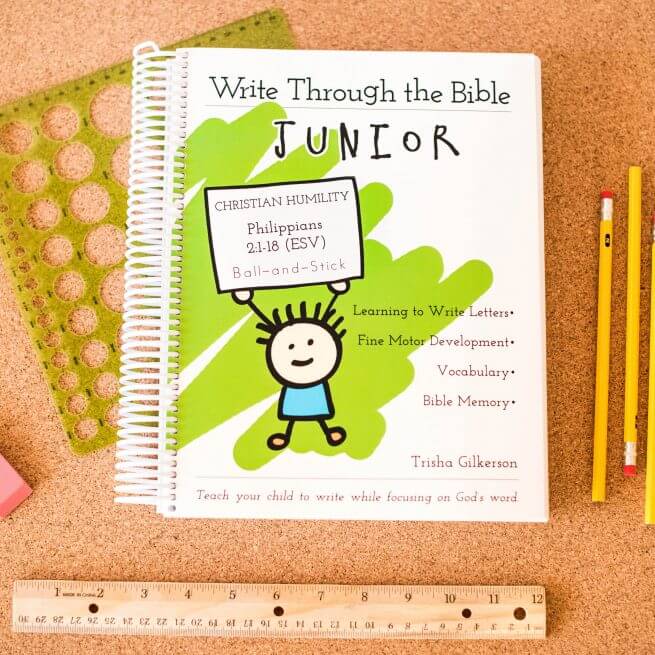“Can’t you kids leave me alone for a few minutes? I can’t even think with you talking to me all the time.”
“I know you think that just because I’m home with you, I can play. But I can’t. I’m working now.”
“I need make a phone call with a business partner, but you still aren’t done with your math. Great. Now you’re going to have to wait for me to check your work.”
Juggling homeschooling and working from home has been a big challenge for me personally. In fact, in some ways, I still consider myself a newbie to this pace of life.
In one sense, I’m not really a newbie. Homeschooling is all my kids have ever known as far as education goes, and my wife has worked from home for years.
But when I quit my full-time job to come home so my wife and I could dive into our own business—as well as jump into the homeschool teacher arena—I wasn’t quite prepared for all the adjustments.
Being home more has meant a lot more time with my kids—which is wonderful.
Except when it isn’t wonderful.
As a Christian, I can write to you about the spiritual lessons I’m learning along the way—the hard lessons about depending on God in prayer, overcoming anger and frustration, and the opportunities I’ve had to shape the character of my kids being home more.
5 Practical Tips for Homeschooling, Work-at-Home Parents
But when it comes to the balancing act of working from home and homeschooling at the same time, there are many practical lessons I’ve learned as well.
I picked the brains of about half a dozen work-at-home, homeschooling parents to get their best advice. This is what they had to say…
1. The Key: Set Office Hours
One of the most important things we hear from successful work-at-home homeschoolers is the value of having set, reasonably uninterrupted hours to work.
I confess: it is easy, in the flexibility of homeschooling, to want to sneak a peek at my inbox or see if one of my virtual assistants has completed a task. Sometimes I can get away with it. It may feel productive, but usually it means I am only doing two or more things half as well as I should.
This approach almost always ends in frustration. Inevitably I get wrapped up in composing an email for work and one of my kids is ready for me to check their school work. I keep holding up my finger, “Just one more minute, honey.” Patience starts to wear thin. The kids get distracted and derailed. I get upset.
Multitasking is hard. Period. When we multitask, it’s as if our brains become a bottleneck: constantly shifting gears means we can never get focused on any one thing very well. We lose time. We lose productive focus. Our kids pay the price for having a non-attentive parent.
Multitasking has also been shown to release stress hormones, which make us easy to upset.
So set aside time to work, and be realistic about setting office hours, especially when you have young children. What will help you to have uninterrupted time?
- Morning work hours before the kids get up?
- Evening hours after they are asleep?
- Afternoon hours when school is done and the kids are happily playing?
- Or do you need to find help—hire a tutor or nanny to help for a few hours during the week? Or on a weekend?
For our family, this means that I often have an hour early in the morning to work before the kids get up, and depending on the day, I can sometimes work in some time after we’re done with school in the afternoon. For my wife—the night owl—this means she’s often working late at night when the kids and I are asleep. We also hire a babysitter to come in most Saturdays to watch the kids for an 8-10 hour block of time so we can get a lot of work done together—this is our most productive work time of the week.
When you set office hours, punch out when you plan to punch out. It’s too easy to try to sneak in an extra hour of work while you pacify kids with take-out and more screen time. Don’t make this the habit.
2. Create Routines. Strive for Regularity.
For us, schedules can change from week to week, but during the school year, we strive to have some sense of “normal.” We strive for a routine for those “normal” weeks. We try to engineer our schedule so that, generally speaking, school during most weekdays looks about the same and work hours look the same. Having routines is helpful not just for us, but especially for our kids.
Routines are powerful. The word “routine” comes from the word “route”—a well-worn path. Blazing a new trail is tough. Walking a well-worn and recognizable path is easier. The more routine school and work become, the easier it is for everyone in the family.
The problem is the life of a work-at-home homeschooler is not always routine. Let’s face it: one of the reasons we love our lives is the flexibility. We love not needing to answer to anyone if we want to take an impromptu field trip, if we want to take a day off, or if we want to serve the unpredictable needs of others. Flexibility is a wonderful blessing.
But flexibility should not mean irregularity. There’s a time to break from routine, but routine should become the bedrock of family life.
3. Account for Life: Build in Breathing Room
No matter how we organize our schedules, we need to build enough margin into our schedules so we can “account for life.”
Some work-at-home parents have such a gingerly planned schedule, like a house of cards, the slightest misstep can send the whole day toppling down. If your schedule can’t take an overflowing toilet, a sick child, or even a planned dentist appointment you’ve known about for 6 months, you are booking yourself too tight. Don’t be ruled by an overpacked schedule.
How do we “account for life”?
- We do this by figuring out what items on the schedule are important (core school subjects, getting necessary work done, etc.) and what items are tertiary (such as out-of-the-house extracurriculars that stretch the schedule too thin).
- We do this by not planning the day minute by minute but by having general goals and large blocks of time to complete groups of tasks.
4. Set Family Expectations About Work
Regardless of what you think is best as far as school hours and work hours, it is critical you make your work needs known to the family.
It isn’t enough to set office hours: you need to let others known in advance what those hours are and why you have them.
Your spouse and kids need to understand the one, two, three, or more hours you have booked for working are important to your productivity.
Not only that, but your work hours are important for your time as a family: you want dedicated time to work so your time with family is pleasurable and undistracted.
If you don’t set clear expectations, people can easily end up being resentful because you aren’t paying anyone due attention.
5. Move Kids Towards “Accountable Independence”
One of the most important goals of homeschooling is fostering independent learners: to train children to take charge of their own learning. Children need to have both the self-motivation and skills necessary to pursue their own studies.
In the early years, education needs to be more hands-on. You, the parent, need to be more intimately involved in order to teach these skills and motivations. During these years, having dedicated parent-child school time is a must.
But as kids grow in independence, it is equally important to maintain some system of accountability. It’s freeing when you don’t need to sit next to your kids for every. single. subject. of. the. day. It’s so freeing, in fact, it’s easy to grab some extra hours of work and forget that your kids still need oversight.
It is easy to think kids are “doing the work” because they checked off all the necessary boxes, but we’ve learned the hard way this isn’t always the case.
- Some kids do the bare minimum in order to just “be done” with school for the day, dramatically reducing any actual learning.
- Some kids will flat out lie to you. One of our kids did, and we lost months of time in certain subjects.
Independent learning does not mean unaccountable learning. No matter how independent your kids get, make sure they are actually comprehending what they are learning.
Balancing School and Work Means Joy
I love the privilege and blessing of being able to work from home, to be around my wife and kids more. In many ways, it’s the life I’ve always dreamed of.
But I’ve learned the hard way that not following some simple principles of organization can lead to chaos and suck the joy from my heart and home.
And the last thing I want is for my kids to be stuck at home with an unjoyful parent.
If you’re a homeschooling, work-at-home parent what are some of your best tips for keeping everything balanced?












Leave a Comment